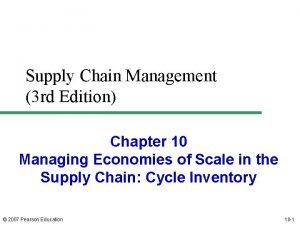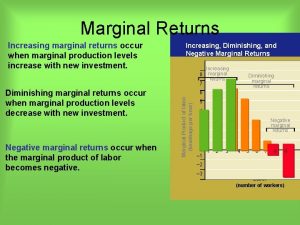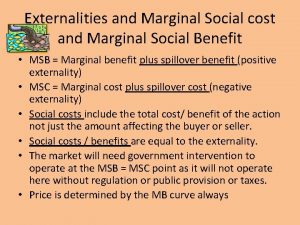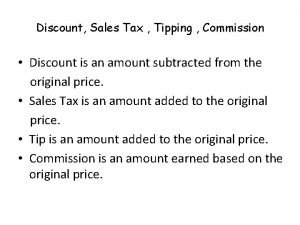Social Discount Rate Consumers Savers Marginal Rate of












- Slides: 12

Social Discount Rate • Consumers (Savers): Marginal Rate of Time Preference (MRTP) • Producers (Investors): Marginal Rate of Return on Investment (MRRI) • Under appropriate assumptions: – Social Discount Rate (SDR) = MRTP = MRRI – Equals “market” interest rate

Consumers-Savers X 1 x 0 I 1 X 0

Producers-Investors X 1 x 0 X 0

X 1 X 0

Social Discount Rate But in reality not a single interest rate for all savers and investors • Factors affecting interest rates: – Transactions costs – Differences in risks – Different time horizons – Taxes – Direct interventions in credit markets

Transactions Costs

Transactions Costs of Financial Intermediation r Si Ss ri’ ri rs ’ rs Di ∆I ∆S ∆K K

Blended Rate • Capital for project is combination of additional savings and reduced investment in private sector (crowding out) • ∆K = ∆S - ∆I • SDR = (∆S/∆K)*rs + (∆I/∆K)*ri – Harberger: Empirical studies show savings rates insensitive to interest rates ( S/ r 0), so ∆S 0 – SDR ri

Ss = S I r ri’ ri rs Di Ds ∆I = ∆K ∆S = 0 K

“Small” Investments • In the previous examples, we have examined the effects of “large” investments • The amount of capital needed for the new investment is enough to affect market interest rates • But many investments are not so big, will not affect interest rates – For these scale of investments, the supply of savings may be considered to be perfectly elastic

r ri Si rs Ss Di ∆S = ∆K ∆I = 0 K

“Small” Investments • • • ∆K = ∆S - ∆I SDR = (∆S/∆K)*rs + (∆I/∆K)*ri But now ∆I = 0 SDR = rs So, for “Small” investments, the social opportunity cost of capital should be consumers marginal rate of time preference (MRTP), which is < MRRI
 Chapter 6 consumers, savers, and investors answer key
Chapter 6 consumers, savers, and investors answer key Protecting consumers savers and investors examples
Protecting consumers savers and investors examples Tertiary consumer
Tertiary consumer Primary producers
Primary producers Trade discount cash discount
Trade discount cash discount Trade discount vs sales discount
Trade discount vs sales discount How to get the discount rate in business math
How to get the discount rate in business math What is single trade discount
What is single trade discount Role of cycle inventory in supply chain
Role of cycle inventory in supply chain Marginal unit quantity discount
Marginal unit quantity discount Cargill lifesavers
Cargill lifesavers Energy tax savers
Energy tax savers Savers and investors role in financial markets
Savers and investors role in financial markets






















